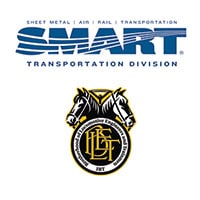
CLEVELAND, Ohio (March 6) — SMART Transportation Division (SMART-TD) and the Brotherhood of Locomotive Engineers and Trainmen (BLET) jointly petitioned the Federal Railroad Administration (FRA) on March 6 to take action in responding to the rapidly spreading COVID-19 (coronavirus) in the United States.
“With at least 231 patients treated in 22 states, and at least 14 deaths at the present time … we and other rail labor Organizations take this issue very seriously, and we have been monitoring it closely,” wrote SMART-TD President Jeremy Ferguson and BLET President Dennis R. Pierce in a letter to FRA Administrator Ronald J. Batory.
The two union presidents pointedly questioned the FRA’s lack of an action plan to help address the potential spread of the coronavirus among rail workers.
“As you are likely already aware, over the last several weeks multiple departments within the Department of Transportation … have issued guidelines to employers on how to approach this issue, along with statements and guidelines focused on educating and protecting the crew members, passengers, and consumers who may be impacted by this deadly disease,” the union presidents wrote. “To our knowledge, the FRA has overlooked, or perhaps outright disregarded, its responsibility to get involved with this matter.”
The presidents urged FRA to issue guidelines directed at U.S. rail carriers, employees and passengers similar to those issued by other departments within the DOT.
Those would include:
- Sanitizing equipment such as (but not limited to) locomotive cabs, computers, remote control boxes and communal areas such as passenger cars, offices, crew staging areas, company provided ground transportation, and away-from-home lodging facilities.
- Providing crews and passengers with personal protective equipment, alcohol-based hand sanitizer strong enough to kill viruses, and other cleaning supplies as deemed appropriate.
- Encouraging employees to stay home if they have respiratory symptoms (such as coughing, sneezing, shortness of breath, and/or fever) that are similar to those associated with the coronavirus and to leave if they develop such symptoms while working.
- Strongly encouraging rail carriers to relax current attendance policies which can be described as unforgiving, at best, to employees who miss work due to illness.
- Educating all rail employees (including supervisory staff) on the appropriate guidelines for self-monitoring of their health, as well as monitoring and addressing others who appear to be symptomatic.
- Reporting to appropriate health departments where employees have shown aforementioned symptoms that prevent them from carrying out their assigned duties.
- Developing plans for employees who reside with, and/or come into direct contact with individuals who are symptomatic.
- Encouraging carriers to develop health programs and practices which exceed FRA’s recommended guidelines.
- Encouraging all parties to understand and comply with other such guidelines issued by the Centers of Disease Control and Prevention (CDC).
Presidents Ferguson and Pierce concluded by again urging prompt action from FRA to protect the safety of railroad workers and the traveling public.
“Further, we ask that you provide continual updates to these guidelines, as other departments have done. Please advise of your plans pertaining to this very serious situation,” they wrote.
Related News
- Virginia 2-PC Law Could Become a Reality if We Act Now
- WATCH: Members Step Up to Take Care of Their Own
- Metro Micro Operators Overwhelmingly Ratify First Contract
- New Documentary Features California Local 1741 Bus Operators
- WATCH: Railroaders Meet Life’s Risks Head-On
- What Does $73.16/Hour Actually Mean?
- New Jersey Leads with Rail Safey Law
- “The Safety Program That Works — And Why Railroads Won’t Use It”
- Jobs Still Protected After Merger Delay
- Recommit to the Work Ahead this MLK Day